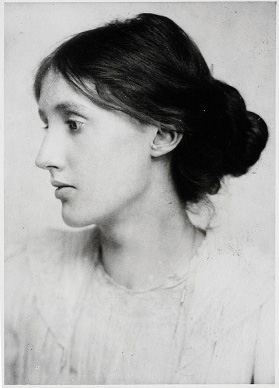This is “Virginia Woolf (1882–1941)”, section 8.5 from the book British Literature Through History (v. 0.1). For details on it (including licensing), click here.
For more information on the source of this book, or why it is available for free, please see the project's home page. You can browse or download additional books there. To download a .zip file containing this book to use offline, simply click here.
8.5 Virginia Woolf (1882–1941)
PLEASE NOTE: This book is currently in draft form; material is not final.
Learning Objectives
- Ascertain the state of women’s rights during Virginia Woolf’s lifetime.
- Recognize the influence of the Bloomsbury Group on modernism.
Biography
Video Clip 2
Virginia Woolf
(click to see video)Click to watch a video mini-lecture biography onWoolf.

Virginia Woolf.
by George Charles Beresford, 1902
The Bloomsbury Group
Originating in friendships established at Cambridge University, the Bloomsbury Group consisted of writers, artists, and intellectuals who influenced Modern British literature and art. The name Bloomsbury came from the neighborhood in London where several members of the group lived and worked. Their work and their lifestyles were bohemian and controversial, affecting modern views on feminism and sexuality as well as literary criticism, art, and publishing. The circle of friends now known as the Bloomsbury Group included Virginia Woolf and her husband Leonard Woolf, her sister Vanessa Bell and her husband Clive Bell, writer Lytton Strachey, writer E.M. Forster, and economist Maynard Keynes.
Text
- A Room of One’s Own. Project Gutenberg of Australia.
- A Room of One’s Own by Virginia Woolf. eBooks@Adelaide. The University of Adelaide Library. University of Adelaide, South Australia.
A Room of One’s Own
In 1928, Virginia Woolf gave a series of lectures at Newnham and Girton Colleges, women’s colleges at Cambridge University. A year later, she published a revision of her lectures as A Room of One’s Own. Woolf’s premise that a woman must have “money and a room of her own” if she is to become a writer applies literally to becoming a career writer, but more broadly to the idea that women must have the independence and education to support themselves and the political freedom to assume such places in a society that gives preference to men. In speaking on this subject to women attending college, Woolf reminds them and future readers that women have had that right for only a brief time.
In one of the more well-known sections of her lectures, Woolf creates the fictional story of Shakespeare’s sister. What if, she surmises, Shakespeare had had a sister who was just as gifted and talented as Shakespeare himself? Would that sister, whom she calls Judith, have been able in the 16th century to become a writer like Shakespeare? Woolf tells a hypothetical story in which Judith attempts to follow her brother’s footsteps. Instead of being allowed to spend time reading and writing, Judith would have been beaten by her father and compelled to marry. She certainly would not have been allowed to attend school. Woolf describes Judith running away to London, where we know that Shakespeare himself had a successful career as an actor, the manager of a theatrical company, and of course a playwright. Judith, on the other hand, is unable, because of society’s restrictions on women, to do any of those things. Woolf’s hypothetical story is a reminder of what women have accomplished but also an appeal for women to continue to strive for equality.
Key Takeaways
- Virginia Woolf, like Mary Wollstonecraft over 130 years earlier, advocated educational opportunities for women.
- Virginia Woolf was a member of the literary coterie known as the Bloomsbury group.
Exercise
Like Mary Wollstonecraft over 100 years earlier, Virginia Woolf was concerned about the lack of educational opportunities for women. One method of exploring this concern is the hypothetical story she writes in the “Shakespeare’s Sister” section of A Room of One’s Own. What if, Woolf asks, Shakespeare, the greatest writer of the English language, had a sister who was just as talented, just as intelligent as he? Would we now be studying Shakespeare’s sister just as we study Shakespeare? Obviously, her answer is no. Societal factors in the 16th century would prevent Miss Shakespeare from becoming a writer. Her natural talent would be useless because sixteenth-century society would not allow her the opportunity to develop it.
From what you’ve learned about the Romantic Period, the Victorian Age, and the early 20th century, would a woman in these three time periods have a different experience from Woolf’s hypothetical Judith? Provide specific evidence to support your answer.
Resources
Biography
- “Virginia Woolf.” Chronology. Dr. Joe Pellegrino, Georgia Southern University.
- “Virginia Woolf.” Learning: Changing Language. British Library. brief biography, digital image of Woolf’s handwritten draft of Mrs Dalloway, and explanation of stream of consciousness.
- “Virginia Woolf.” Women’s History. Gale Cengage Learning.
- “Virginia Woolf (1882–1941): A Short Biography.” S. N. Clarke. Virginia Woolf Society of Great Britain.
Bloomsbury Group
- “Archive Journeys: Bloomsbury.” Tate Learn Online.
- The Bloomsbury Group: Artists, Writers, and Thinkers.
- “Intimate Relations.” Cambridge Life. University of Cambridge.
Text
- A Room of One’s Own. Project Gutenberg of Australia.
- A Room of One’s Own by Virginia Woolf. eBooks@Adelaide. The University of Adelaide Library. University of Adelaide, South Australia.
Guides and Discussion Topics for A Room of One’s Own
- Abyss Notes/Reading Guide for Virginia Woolf’s A Room of One’s Own. Dr. Elisa Kay Sparks, Clemson University.
- Virginia Woolf, A Room of One’s Own (1929). Prof. Catherine Lavender, The College of Staten Island of The City University of New York.
Audio
- A Selection from A Room of One’s Own. Listen To Genius! Redwood Audiobooks. Download for personal use only; not for distribution.
Video
- Virginia Woolf. Dr. Carol Lowe, McLennan Community College.
- “Virginia Woolf’s Broadcasts at the BBC 1937.”
Images
- “Virginia Woolf.” Great Britons: Treasures from the National Portrait Gallery, London.




